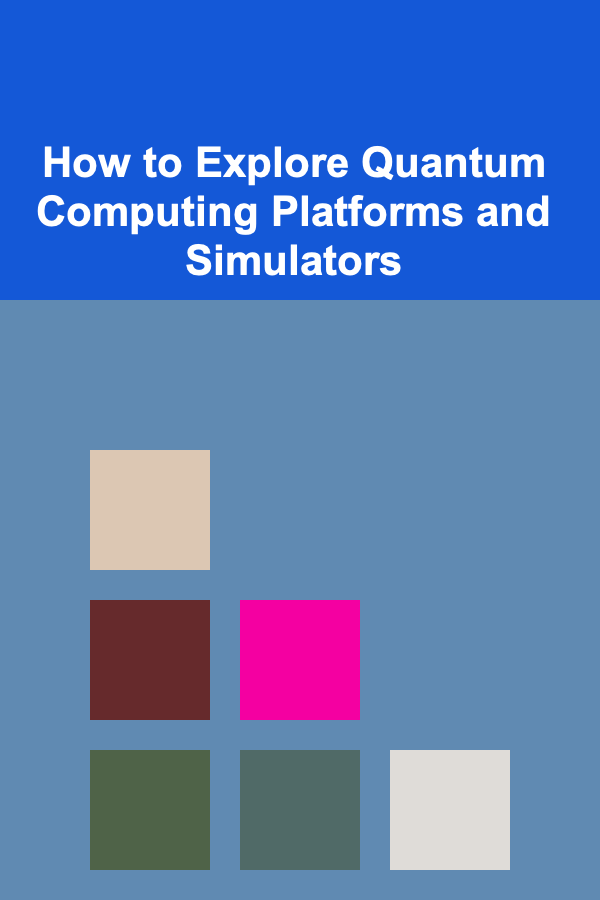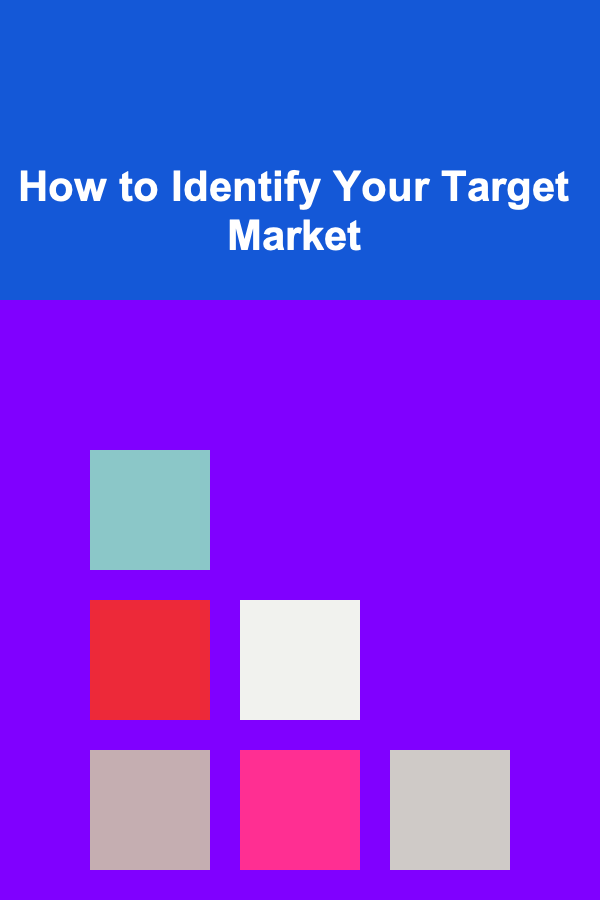
How to Explore Quantum Computing Platforms and Simulators
ebook include PDF & Audio bundle (Micro Guide)
$12.99$9.99
Limited Time Offer! Order within the next:

Quantum computing is poised to revolutionize the way we solve problems that are currently beyond the capabilities of classical computers. It offers unprecedented computational power by leveraging the principles of quantum mechanics, such as superposition, entanglement, and quantum interference. As quantum computing moves from theoretical concepts to practical applications, the need to explore, learn, and experiment with quantum systems has never been more critical.
In this article, we will guide you through the exploration of quantum computing platforms and simulators. We'll discuss the basics of quantum computing, dive into the most popular platforms, and explore how simulators allow us to experiment with quantum algorithms. By the end, you should have a solid foundation on how to navigate the world of quantum computing.
The Basics of Quantum Computing
Before diving into platforms and simulators, it's important to have a brief understanding of quantum computing. While quantum computing is a vast field, here are a few key concepts that differentiate it from classical computing:
1. Qubits : The fundamental unit of quantum information is the quantum bit or qubit. Unlike classical bits, which can be in one of two states (0 or 1), qubits can exist in multiple states simultaneously due to a property called superposition. This enables quantum computers to process multiple possibilities in parallel, making them vastly more powerful than classical computers for certain tasks.
2. Superposition: Superposition allows a qubit to exist in a combination of both 0 and 1 states at the same time. This gives quantum computers the ability to perform computations on a broader range of possibilities simultaneously, as opposed to evaluating them one at a time like classical computers.
3. Entanglement: Entanglement is a phenomenon where two or more qubits become linked in such a way that the state of one qubit is dependent on the state of another, no matter how far apart they are. This enables qubits to work in coordination in ways that classical bits cannot, making it possible to perform operations on vast amounts of data concurrently.
4. Quantum Interference: Quantum interference allows quantum states to combine in ways that amplify correct solutions while canceling out incorrect ones. This property is fundamental to quantum algorithms like Shor's algorithm for factoring large numbers, which can outperform classical counterparts.
These principles provide the foundation for understanding how quantum computers work, but implementing them requires sophisticated tools, platforms, and simulators. Now, let's explore the available quantum computing platforms and simulators that make it possible to experiment with quantum algorithms.
Quantum Computing Platforms
Quantum computing platforms provide both hardware and software solutions that allow users to develop and test quantum algorithms. These platforms are often cloud-based, enabling access to quantum processors that may not be available locally. Below are some of the most prominent quantum computing platforms:
1. IBM Quantum Experience
IBM's Quantum Experience is one of the leading platforms for accessing real quantum hardware and simulators. It allows developers, researchers, and students to run quantum algorithms on IBM's quantum processors.
Key Features:
- Access to Real Hardware: IBM provides access to quantum computers such as the IBM Q 5-qubit and the 16-qubit processors, enabling users to run their algorithms on actual quantum devices.
- Qiskit: Qiskit is an open-source software development kit (SDK) developed by IBM for working with quantum computers. It allows users to write, simulate, and execute quantum programs using Python.
- Quantum Circuits: Users can create quantum circuits using Qiskit and run them on real quantum hardware or simulators.
- Educational Resources: IBM offers a variety of tutorials, documentation, and workshops to help users get started with quantum computing.
IBM Quantum Experience is ideal for both beginners and experts looking to explore quantum computing. It has a user-friendly interface that makes it easy to build and test quantum algorithms, and its integration with Qiskit ensures access to a wide range of resources.
2. Microsoft Quantum Development Kit (QDK)
Microsoft offers a comprehensive suite of tools for quantum computing development through its Quantum Development Kit (QDK). This includes the Q# programming language, simulators, and access to Microsoft's quantum computing cloud service, Azure Quantum.
Key Features:
- Q# Programming Language: Q# is a high-level programming language designed specifically for quantum computing. It integrates with traditional languages like C# and Python, providing a rich environment for quantum algorithm development.
- Quantum Simulators: Microsoft offers several simulators that allow developers to test quantum algorithms without requiring access to physical quantum hardware.
- Azure Quantum: Azure Quantum is a cloud-based service that provides access to quantum processors from various hardware providers, including Honeywell, IonQ, and others. It allows users to execute their quantum algorithms on both simulators and real quantum hardware.
Microsoft's Quantum Development Kit is a powerful toolset for anyone interested in building quantum algorithms. It provides both theoretical and practical resources for learning and experimentation, making it suitable for professionals, researchers, and students.
3. Google Cirq
Google's Cirq is an open-source quantum computing framework designed for the creation, simulation, and execution of quantum circuits on quantum processors. Google is at the forefront of quantum research, with its quantum supremacy milestone being one of the key highlights in the quantum computing field.
Key Features:
- Quantum Circuit Simulation: Cirq allows users to design and simulate quantum circuits, supporting various quantum gates, measurement operations, and state manipulations.
- Integration with Google's Quantum Hardware: For users who want to experiment with real quantum processors, Cirq integrates with Google's quantum hardware, including the Sycamore processor.
- Open-Source: As an open-source project, Cirq is accessible to anyone interested in contributing to the development of quantum software.
Cirq is best for researchers and quantum programmers looking for an advanced platform with cutting-edge tools for quantum circuit design and execution.
4. Rigetti Forest
Rigetti Computing offers a cloud-based quantum computing platform called Forest, which provides access to quantum simulators and quantum processors. Rigetti's hardware is designed for near-term quantum algorithms and optimization problems.
Key Features:
- QCS (Quantum Cloud Services): Rigetti's cloud-based platform allows users to access their quantum processors via the QCS platform. This enables remote execution of quantum circuits on Rigetti's hardware.
- PyQuil: PyQuil is Rigetti's Python library for quantum programming. It allows users to write quantum algorithms, simulate them, and run them on Rigetti's quantum processors.
- Quantum Simulators: Rigetti offers both local and cloud-based simulators, which allow users to experiment with quantum algorithms before running them on actual quantum hardware.
Rigetti Forest is a great choice for developers and researchers who want to experiment with quantum computing in a flexible and scalable cloud environment.
5. Amazon Braket
Amazon Braket is a fully managed quantum computing service offered through Amazon Web Services (AWS). It allows users to develop quantum algorithms using different quantum hardware providers, such as D-Wave, IonQ, and Rigetti.
Key Features:
- Access to Multiple Quantum Hardware Providers: Braket allows users to choose from a variety of quantum hardware platforms, enabling a wide range of quantum algorithms to be tested.
- Quantum Simulators: Braket provides both local and cloud-based simulators to help users develop and test their quantum algorithms.
- AWS Integration: Braket integrates seamlessly with AWS's cloud infrastructure, making it easier to combine quantum computing with other AWS services for scalable solutions.
Amazon Braket is a great platform for users who want flexibility and access to multiple quantum hardware options.
Quantum Simulators
Quantum simulators are essential tools for developing and testing quantum algorithms. While quantum hardware is still in its infancy, simulators allow researchers to model quantum systems and experiment with algorithms without requiring access to expensive quantum computers.
1. Qiskit Aer
Qiskit Aer is a simulation framework within the IBM Qiskit SDK. It provides highly efficient quantum simulators, enabling users to simulate quantum circuits on classical hardware.
Key Features:
- Statevector Simulator: The statevector simulator allows users to simulate quantum algorithms by representing the state of qubits as vectors. It provides accurate results but is limited by classical computing power for large circuits.
- Unitary Simulator: The unitary simulator models quantum circuits in terms of unitary matrices, enabling the simulation of quantum operations.
- Noise Simulation: Qiskit Aer can simulate noise in quantum circuits, making it useful for testing how quantum algorithms perform under real-world conditions.
Qiskit Aer is an excellent choice for simulating quantum circuits at various scales and testing quantum algorithms.
2. Microsoft Quantum Simulator
The Microsoft Quantum Development Kit comes with a powerful quantum simulator that allows users to test their Q# programs without needing access to real quantum hardware. The simulator uses classical computing resources to model quantum systems and execute quantum programs.
Key Features:
- Full-State Simulator: The full-state simulator models the quantum state of the system and supports up to 30 qubits for accurate simulations of small to medium-sized quantum circuits.
- Resource Estimator: Microsoft's simulator can estimate the number of resources (qubits, gates, etc.) required to run a quantum algorithm on a real quantum processor.
The Microsoft Quantum Simulator is useful for testing and refining quantum algorithms before deploying them on real hardware.
3. Q# Quantum Simulator
The Q# quantum simulator is part of the Microsoft Quantum Development Kit and is specifically designed for simulating quantum operations written in Q#. It allows users to test their quantum programs using a classical computer while simulating the quantum behavior of their algorithms.
Key Features:
- Deterministic Simulation: The Q# simulator models the behavior of quantum algorithms deterministically, making it easier to debug and test quantum programs.
- Visual Studio Integration: For users familiar with Visual Studio, the Q# simulator integrates directly into the development environment, providing a seamless experience for quantum software development.
The Q# quantum simulator is ideal for developers and researchers looking for a user-friendly environment to test quantum programs written in Q#.
Conclusion
Quantum computing is still in its early stages, but the landscape is evolving rapidly. By exploring quantum computing platforms and simulators, you can gain practical experience with quantum algorithms and begin to unlock the potential of this transformative technology.
Whether you are a beginner looking to learn about quantum computing or an advanced user developing sophisticated quantum algorithms, there are numerous platforms and simulators available to suit your needs. By taking advantage of these tools, you can contribute to the future of quantum computing and participate in the exciting developments that are shaping the future of technology.
Exploring quantum computing platforms and simulators is an essential step for anyone interested in understanding and applying quantum technologies. As the field continues to grow, the possibilities are endless.
Other Products

How to Create a Personal Financial Plan for Beginners
Read More
How to Identify Your Target Market
Read More
How to Keep Your Home Clean During Renovations
Read More
How to Make Money Online as a Corporate Communications Director: 10 Actionable Ideas
Read More
How to Reduce Your Monthly Expenses Without Sacrificing Lifestyle
Read More